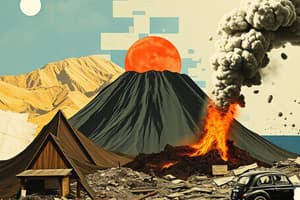Podcast
Questions and Answers
What type of rocks are products of sedimentary processes?
What type of rocks are products of sedimentary processes?
- Igneous rocks
- Metamorphic rocks
- Crystalline rocks
- Derivatives rocks (correct)
What principle states that current geologic processes are the same as those in the past?
What principle states that current geologic processes are the same as those in the past?
- Principle of Uniformitarianism (correct)
- Principle of Original Horizontality
- Principle of Faunal Succession
- Principle of Superposition
How do geologists correlate rock layers?
How do geologists correlate rock layers?
- By classifying the rock layers based on hardness and texture
- By analyzing the distance between the layers
- By measuring the thickness of each layer
- By studying the fossils found in the layers (correct)
What is an index fossil also known as?
What is an index fossil also known as?
What type of rock can regolith and soil be derived from?
What type of rock can regolith and soil be derived from?
How is physical correlation in geology accomplished?
How is physical correlation in geology accomplished?
What does relative dating provide in terms of the age of artifacts and sites?
What does relative dating provide in terms of the age of artifacts and sites?
Which of the following are examples of geological processes?
Which of the following are examples of geological processes?
What is the definition of a geologic hazard?
What is the definition of a geologic hazard?
Which hazard is described as the movement of a mass of rock, debris, or earth down a slope?
Which hazard is described as the movement of a mass of rock, debris, or earth down a slope?
What causes tsunamis?
What causes tsunamis?
What does tephra consist of?
What does tephra consist of?
What is the definition of a tropical cyclone?
What is the definition of a tropical cyclone?
Which hydrometeorological hazard is characterized by a narrow violently rotating column of air extending from rain clouds to the ground?
Which hydrometeorological hazard is characterized by a narrow violently rotating column of air extending from rain clouds to the ground?
What is the distinguishing factor between storm surge and tsunami?
What is the distinguishing factor between storm surge and tsunami?
Flashcards are hidden until you start studying
Study Notes
Sedimentary Rocks
- Products of sedimentary processes include sandstone, limestone, and shale.
- Formed from the accumulation and compaction of sediment over time.
Geologic Principles
- The principle of uniformitarianism states that current geological processes are consistent with those in the past.
Rock Layer Correlation
- Geologists correlate rock layers using physical and chronological characteristics, such as rock type, fossil content, and stratigraphy.
- Physical correlation can be accomplished by matching rock layers at different locations based on their physical features.
Index Fossils
- An index fossil, also known as a guide fossil, is used to identify and date the strata in which it is found.
Regolith and Soil Origin
- Regolith and soil can be derived from the weathering of igneous, metamorphic, and sedimentary rocks.
Relative Dating
- Relative dating provides a sequence of events, helping determine the age of artifacts and sites in relation to one another but does not provide exact ages.
Geological Processes
- Examples of geological processes include volcanic eruptions, erosion, sedimentation, and plate tectonics.
Geologic Hazards
- A geologic hazard is a natural geological process that poses a risk to people and property, such as earthquakes, landslides, and tsunamis.
Mass Movement Hazard
- The movement of a mass of rock, debris, or earth down a slope is known as a landslide.
Tsunami Causes
- Tsunamis are caused by underwater earthquakes, volcanic eruptions, or landslides, displacing large volumes of water.
Tephra Composition
- Tephra consists of volcanic ash, pumice, and other volcanic debris ejected during an eruption.
Tropical Cyclone Definition
- A tropical cyclone is a rapidly rotating storm system characterized by a low-pressure center and strong winds, typically forming over warm ocean waters.
Hydrometeorological Hazard
- A tornado is characterized as a narrow, violently rotating column of air extending from thunderstorms to the ground.
Storm Surge vs. Tsunami
- The distinguishing factor is that storm surge is caused by strong winds from storms pushing water toward the shore, while a tsunami is a series of ocean waves triggered by large disturbances underwater.
Studying That Suits You
Use AI to generate personalized quizzes and flashcards to suit your learning preferences.




